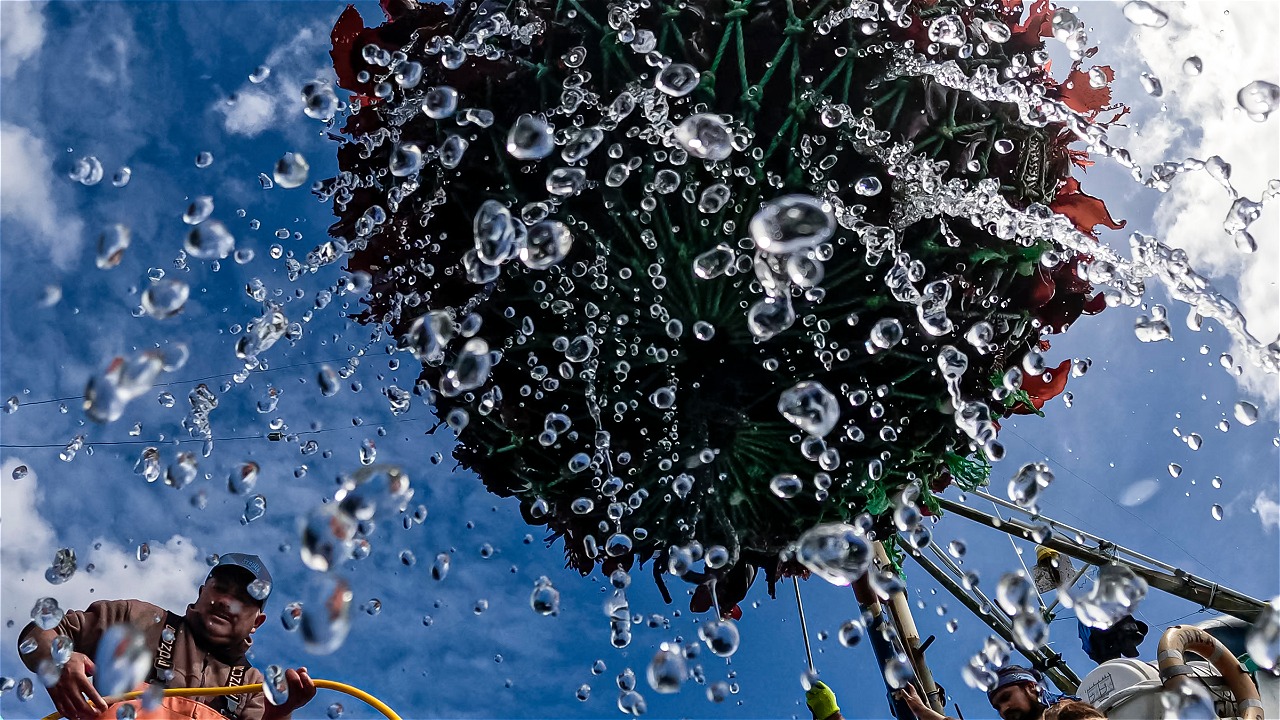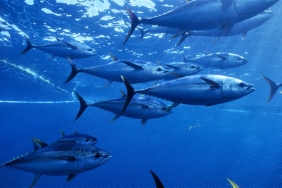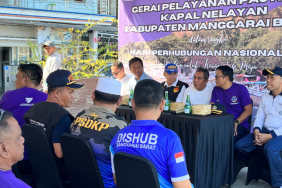ERADICATING FISHERIES CRIMINALS
WWF Indonesia appreciates the government's renewed efforts to curb unlawful, unreported, and unregulated (Illegal, Unreported, Unregulated/IUU Fishing) fishing practices in one of the world's largest archipelagos and also the largest tuna fishery on the planet.
The United Nations Food and Agricultural Organization (FAO) reports that Indonesia was the second largest fishing nation in the world in 2012, after China. Indonesia's fisheries production reached 5.8 million tons with a value of approximately IDR 79.4 trillion (equivalent to USD 6.6 billion) in 2012. This is a huge output from an area of 1,919,440 km2 stretching from the Indian Ocean to the Pacific Ocean and South China Sea.
IUU fishing costs global fisheries 45 billion USD annually. In an interview with The Wall Street Journal, President Joko Widodo revealed that 9/10 of the 5400 fishing boats - or the equivalent of 4860 vessels - in Indonesian waters are operating illegally.
Consistent with President-elect Joko Widodo's stated intention to realize national fisheries development and suppress illegal fishing, Indonesia's Ministry of Maritime Affairs and Fisheries (KKP) has issued strict regulations regarding the industry.
Among the most significant of these regulations are Ministerial Regulation (PERMEN) number 56, issued in late 2014, which temporarily halted the licensing of all forms of fishing activities throughout Indonesia's Fisheries Management Areas (WPP) for any vessels built abroad, as well as PERMEN number 2 of 2015, regarding the prohibition of trawl fishing gear throughout Indonesia's fisheries areas. "The enactment of these regulations ensures fisheries productivity and reduces the number of incidents of non-target fish species or bycatch, such as baby tuna and sea turtles, while also suppressing illegal foreign vessels entering the country, which use such fishing gear," said Capture and Aquaculture Fisheries Improvement Manager, WWF-Indonesia, Abdullah Habibi.
The prevalence of a "puppet system" in Indonesian fisheries was further emphasized by Habibi, whereby foreign-owned fishing companies "borrow" licenses from local fishing companies and even use one license for multiple vessels - a tactic that PERMEN 56 directly addresses.
Habibi praised the minister's consistency in the implementation of these measures. "We have put forward some of the recommendations over the past few years, and what is happening now is yielding good results."
Certainly for many, these measures have been long overdue. Declining fish stocks and intensifying competition among fishing companies to harvest valuable tuna have pushed fishing operations to the eastern region of the archipelago as a result of overfishing in the west. As the intensity of fishing in the eastern region increases without adequate regulation and supervision, the risk of depletion of fisheries stocks in the eastern region is very likely.
Worrying Figures
According to a 2014 FAO report titled The State of World Fisheries and Aquaculture, 87% of commercial fisheries stocks are now overexploited, fully exploited, or significantly depleted. This is an alarming figure as 2.9 billion people worldwide depend on fish for 20% of their protein intake. Fisheries supply 15% of the animal protein in our diets (and more than 50% in many developing countries in Africa and Asia), but this is made up of fisheries that are already overfished or fully exploited, making it impossible to utilize them further.
The chief executive under President Joko Widodo is Susi Pudjiastuti, the new Minister of Maritime Affairs and Fisheries, who has also received much praise for her vision and decisiveness. In her last speech, in front of the Fisheries Quality Control and Safety Quarantine Agency (BKIPM), she emphasized that sustainability should take precedence over prosperity, and that government policies should look at current conditions and better consider future generations.
His drastic measures have made global media headlines; news of illegal vessels from Thailand and Vietnam that had been captured last December and then blown up and scuttled after the crews were evacuated, was one of the media highlights of The Economist on January 3. Another regulation, PERMEN 57 of 2014, also prohibits transhipment, which regulates the activity of small boats unloading their fish catch onto larger vessels with refrigeration. Some groups have argued that small-scale pole and line fishers will be affected by this regulation; a January 14 article in The Guardian described them as 'unintended victims' of the regulation's implementation, having to face 'increased fuel prices' when they have to bring their catch back to port.
This is not true, says Habibi. "The fishing period in a single trip of Pole and Line fishermen in Indonesia is very short, from one to four days maximum, so they are not the problem and victims of the regulation. They go to the fishing grounds, then return to the port. Therefore, the regulation on transhipment is not a problem for them.
However, PERMEN 57 will limit and reduce fleets that target tuna and skipjack fishing, Habibi said - many of those fleets go to sea for days and or fleets that unload fish from one port to another, and still engage in IUU Fishing. Alfred "Bubba" Cook, Western and Central Pacific Tuna Program Manager of WWF Smart Initiative (SFI) said directly: "The fact is that transhipment activities at sea are one of the biggest mechanisms facilitating IUU Fishing activities globally."
WWF has supported other ways to work with the new law.
Finding Loopholes
The FAO's agreement on Port State Measures (PSM) to prevent, deter and eradicate IUU Fishing adopted at the FAO conference in 2009 can be an important foundation. Because IUU Fishing practices usually look for loopholes in systems and regulations. Ports that are not strict are the perfect place to bring their catch from the ship to the storefront, as reported by the FAO website. Ports that ratify the agreement will commit to inspect, monitor, and deny entry to vessels engaged in IUU fishing practices. The treaty will take effect once it has been approved and signed by 25 countries; 11 have signed so far, but Indonesia is not yet on the list.
"The new regulations should also serve as an impetus for Indonesia to act quickly in ratifying PSM," said Dr. Jose Ingles, Coral Triangle Program coordinator for Fishery Improvement Projects and Policy from WWF. "There are several sets of regulations that the government must strengthen, and the PSM serves as a further deterrent in addressing IUU fishing practices."
Through such decisive action, ""Indonesia has set a good example, and hopefully other countries can follow suit and tackle IUU Fishing seriously in terms of law enforcement,"" said Jackie Thomas, WWF Coral Triangle Program Chair. Indonesia is one of the 6 countries that make up this important region. ""We have to consider the importance of fisheries and resources, and the source of food security for millions of people."
Port state measures could be one of the best answers for vessels operating in the open sea. But for vessels operating in archipelagic waters in Indonesia, other measures are also needed. Simple documentation, such as good records for boat owners, as well as proof that they pay taxes regularly and implement all regulations (i.e. on-board observers, VMS, AIS), can be very beneficial.
Now that Indonesia has set the legal groundwork, Habibi hopes that mechanisms are implemented to ensure that they comply with the regulations. ""We are very concerned about related matters to ensure supervision and monitoring of the regulations, because a law is nothing if it is not carefully implemented."
""In order for Indonesia to curb the practice of IUU Fishing, there must be an efficient inspection system at ports, where the use of logbooks, observers, and other reporting obligations are strictly enforced,"" Dr. Ingles added. ""This system would target the domestic fleet which is not covered by the PSM agreement."
In the end, Habibi called on all other sectors to unite behind the government and help end the practice of IUU Fishing. ""Currently, Minister Pudjiastuti is implementing the law and maintaining a strong stance, but some fisheries associations and parliament are trying to relax the regulation. We call for support for the policy to end the practice of IUU Fishing, and for companies not to make efforts to weaken the policy. ""
Source: Blowing up the bad guys: Will Indonesia's new fisheries laws deliver?





